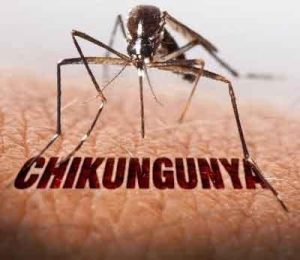- Home
- Editorial
- News
- Practice Guidelines
- Anesthesiology Guidelines
- Cancer Guidelines
- Cardiac Sciences Guidelines
- Critical Care Guidelines
- Dentistry Guidelines
- Dermatology Guidelines
- Diabetes and Endo Guidelines
- Diagnostics Guidelines
- ENT Guidelines
- Featured Practice Guidelines
- Gastroenterology Guidelines
- Geriatrics Guidelines
- Medicine Guidelines
- Nephrology Guidelines
- Neurosciences Guidelines
- Obs and Gynae Guidelines
- Ophthalmology Guidelines
- Orthopaedics Guidelines
- Paediatrics Guidelines
- Psychiatry Guidelines
- Pulmonology Guidelines
- Radiology Guidelines
- Surgery Guidelines
- Urology Guidelines
Elderly succumbing to chikungunya due to low immunity, chronic health issues

New Delhi : With most of the 10 chikungunya deaths in the national capital being of elderly people, health experts say there are more chances of elderly patients succumbing to the vector borne disease due to their low immunity levels, combined with chronic health problems like heart or kidney ailments.
Terming the process as Trigger Mechanism, experts treating chikungunya, dengue and malaria patients, also categorically stated that no one dies of chikungunya, but if a person has a history of a chronic disease then it may get aggravated or reactivated by the chikungunya virus, leading to death.
"It's all about the immunity level. Though chikungunya cannot kill someone it can trigger the problems of an old chronic disease. In case an elderly patient suffering from kidney or cardiac disease gets chikungunya, then there are chances of the kidney and the cardiac disease to become severe, leading to death, as immunity level is very low then," Sumit Ray, who heads the critical care unit at Sir Ganga Ram Hospital, told IANS.
Sir Ganga Ram Hospital witnessed deaths of four elderly patients, suffering from chikungunya. The patients also had a history of diabetes and kidney ailments.
Ray explained the entire procedure and said: "Usually in viral infections, the body tries to fight back by releasing certain toxins to kill the bacteria or the virus of the disease. Most of the time it is a balance process and the person gets cured, like among the young and adults."
However, in some cases the immunity system of the patients is low and the virus and infections dominate the body organs.
"The problem can be severe among those who already have kidney problems, chest infections and heart diseases. The virus can stop the functioning of the organs. This is mostly common among elderly patients with low immunity power. The whole story is about immunity," said Ray.
S.P. Byotra, chairman of medicine department at Ganga Ram Hospital, said that once the virus dominates the body organs due to low immunity, the first thing that gets affected is blood pressure.
"The blood pressure starts affecting all the organs once it is out of control, which can lead to multi-organ failure, leading to death. People who have good immunity can survive it, but elderly patients who do not have good immunity have less chances to survive in such situations," Byotra told IANS.
Of the 10 patients who died due to complications triggered by chikungunya, nine were reported to be elderly patients. Only the first patient to succumb was a 22-year old woman who died on September 1 at Bara Hindu Rao Hospital.
According to medical experts, even if the Trigger Mechanism is because of mutation in the strains of the chikungunya virus, immunity has a big role to play in the survival of the patient.
Reiterating the fact that no one is dying of the chikungunya virus, Lalit Dar of All India Institute of Medical Sciences (AIIMS) said that people are also suffering from other chronic disease at the same time which in combination with chikungunya causes death.
AIIMS so far has seen two deaths caused by the health complications due to chikungunya.

Disclaimer: This site is primarily intended for healthcare professionals. Any content/information on this website does not replace the advice of medical and/or health professionals and should not be construed as medical/diagnostic advice/endorsement or prescription. Use of this site is subject to our terms of use, privacy policy, advertisement policy. © 2020 Minerva Medical Treatment Pvt Ltd